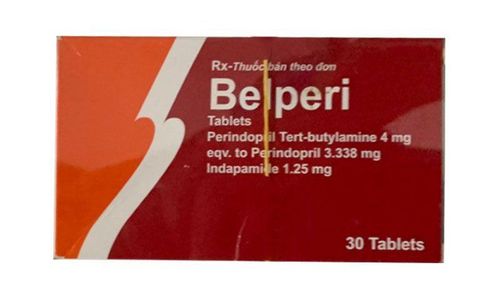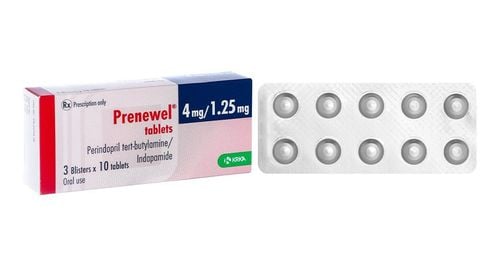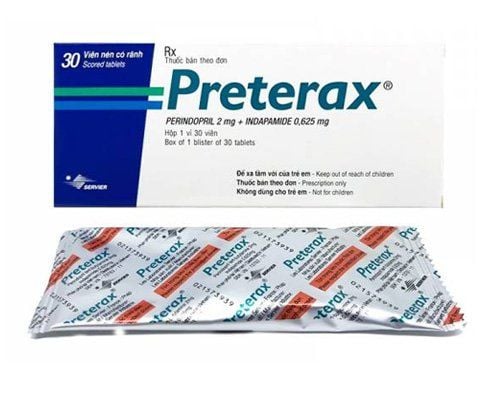This is an automatically translated article.
Covapril with the active ingredient Perindopril, belongs to the class of angiotensin-converting enzyme (ACE) inhibitors, which work by dilating blood vessels to make it easier for blood to flow. The drug is commonly used to treat high blood pressure and to reduce the risk of angina or death from heart problems in people with coronary artery disease.
1. What does Covaprile do?
What does Covaprile do? Covaprile with the active ingredient Perindopril (as Perindopril tertbutylamine), belongs to the group of angiotensin converting enzyme (ACE) antagonists. The drug works to lower blood pressure by reducing systemic peripheral resistance by dilating arteries and possibly veins.
In patients with congestive heart failure, Covaprile reduces left ventricular hypertrophy and subendocardial collagen excess, myocardial reperfusion, and the occurrence of arrhythmias.
Covaprile reduces cardiac load (both preload and afterload) by reducing right and left ventricular filling pressures, decreasing systemic peripheral resistance, and increasing cardiac output.
2. Indications of the drug Covaprile in which case?
Covaprile is indicated in the following cases:
Treatment of hypertension, especially hypertension in patients with diabetes mellitus. Congestive heart failure. Stable coronary artery disease.
3. Contraindications of Covaprile
Covaprile is contraindicated in the following cases:
Patients with a history of allergy, hypersensitivity to any ingredient of the drug. The patient has a history of angioedema (Quincke's edema) associated with the use of angiotensin-converting enzyme (ACE) antagonists. Children under 15 years old.
4. How to use and dose Covaprile
4.1. How to use Covaprile is prepared in the form of tablets, each containing 4mg, for oral use. Before taking the medicine, the patient should consult the doctor and carefully read the instructions for use, the drug information on the package to use the medicine correctly. When swallowed whole, do not crush the drug and should be taken in the morning before meals. The patient should take the medicine at a fixed time of the day so as not to forget the dose. Do not arbitrarily increase or decrease the dose of the drug or prolong the time of taking the drug more than the time prescribed by the doctor. 4.2. Dosage For hypertensive patients:
The recommended dose is 4mg/day, taken once in the morning. Depending on the patient's response, the dose can be adjusted in 3-4 weeks after taking the drug, the maximum dose: 16mg / day, divided into 2 times.
In case of renal failure, adjust the dose of Covaprile based on the degree of renal impairment, calculated based on the creatinine clearance (CrCl) as follows:
Creatinine clearance (CrCl) from 30 to 60 ml/min: 2mg orally /day Creatinine clearance (CrCl) 15 to 30 ml/min: 2mg every two days. Creatinine clearance (CrCl) <15ml/min: 2mg orally on the day of dialysis. For patients with congestive heart failure
Start treatment with a dose of 2mg, taken once in the morning. The maintenance dose is from 2mg to 4mg, can be increased to a maximum of 16mg/day. For patients with stable coronary artery disease (CAD)
Initiate treatment with 4 mg orally daily for 2 weeks, then increase the dose as tolerated to 8 mg/day orally in two divided doses.
5. Undesirable effects of the drug Covaprile
When using Covaprile, patients may experience some of the following undesirable effects:
Nervous system: Feeling tired, dizzy, headache, sleep disturbance, cramps, orthostatic hypotension, On the skin: Allergies, rash, itching, angioedema Digestive system: Stomach pain, loss of appetite, dry mouth nausea, abdominal pain, taste disturbance. Respiratory system: Dry cough. Cardiovascular system: The drug may cause orthostatic hypotension. Patients need to inform the doctor about the unwanted effects encountered when using the drug for appropriate management.
6. Be careful when using Covaprile
When using Covaprile, the following information should be noted:
The drug should be discontinued and medical intervention instituted if the patient develops symptoms of edema of the tongue, glottis or larynx. Covaprile should not be used in hypertensive patients with bilateral renal artery stenosis. In cases where the use of the drug is mandatory, renal function should be monitored during the first few weeks of treatment for the patient. A dry cough is common when taking Covaprile. Cough is persistent, there is no sputum, and the cough stops after stopping treatment. Patients need to inform the treating doctor fully about their medical condition, especially when suffering from diseases such as: kidney failure, heart failure, diabetes, atherosclerosis, renal artery stenosis, low blood pressure or eating abstain from salt...so that the doctor can have a suitable treatment plan. Covaprile should not be used in children under 15 years of age because there is no research to prove the safety and effectiveness of Covaprile for this subject. Pregnant women: Discontinue as soon as pregnancy is detected, especially in the second and third trimesters of pregnancy, Covaprile can cause fetal harm including hypotension, hypoplasia of the skull in the neonate. birth, anuria, reversible or irreversible renal failure, and death. Lactation: There are no studies to know if Covaprile passes into breast milk, mothers should use caution When driving or operating machinery: The drug can cause harmful effects. Side effects such as dizziness, headache, orthostatic hypotension, so people who are driving and operating machinery need to be careful when using Covaprile.
7. Covaprile drug interactions
Avoid the combination of Covaprile with the following drugs:
Potassium-sparing diuretics, potassium supplements: because of the potential for fatal hyperkalemia, especially in cases of renal failure. Lithium: Because it can increase the concentration of lithium in the blood to the point of toxicity. Estramustine: Because of the increased risk of undesirable effects such as angioedema - neuroleptic. Non-steroidal anti-inflammatory drugs (NSAIDs): may reduce the effect of Covaprile and increase side effects on the kidneys. With strong sedatives, tricyclic antidepressants: increased antihypertensive effect and increased risk of orthostatic hypotension. Above are the uses and special notes when using Covaprile. Patients need to consult their doctor, pharmacist before taking the drug to achieve effective use of the drug and avoid unwanted effects.
Follow Vinmec International General Hospital website to get more health, nutrition and beauty information to protect the health of yourself and your loved ones in your family.













